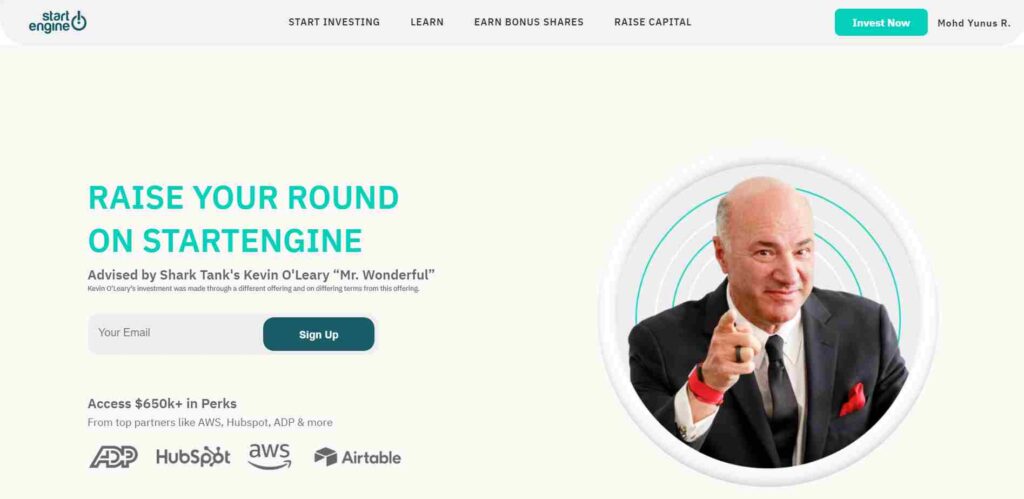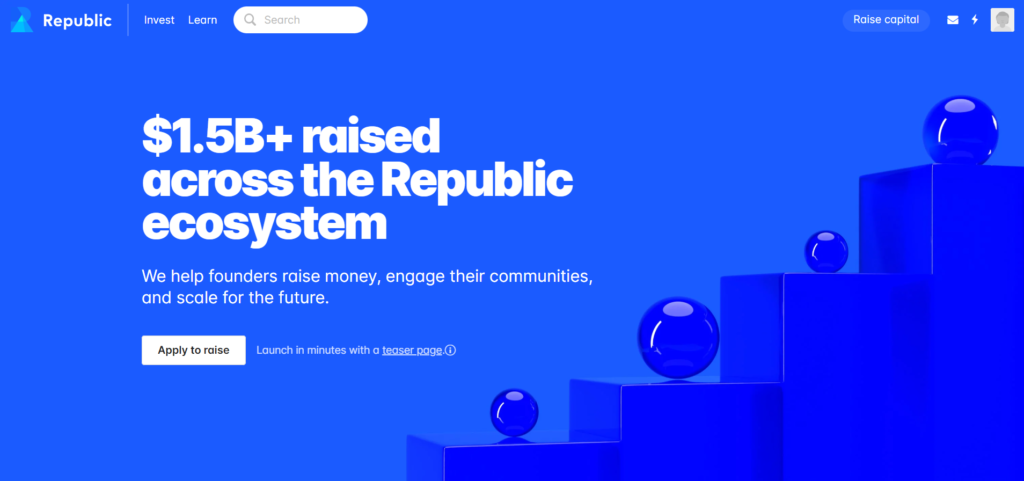StartEngine vs Republic are two popular crowdfunding platforms that allow startups and small businesses to raise capital from a large pool of investors.
While both platforms offer similar services, there are differences in their approaches and features. StartEngine provides a range of investment opportunities, including equity crowdfunding, token offerings, and revenue sharing, while Republic primarily focuses on Title III equity crowdfunding.
StartEngine vs Republic: Summary
- StartEngine has a minimum investment of $100 to get started.
- On the other hand, Republic’s minimum investment is much lower at just $20, depending on the company.
- StartEngine offers a secondary market for investors to sell their ownership stakes early if they would like.
- The Republic does not currently offer a secondary market, though they have plans for one.
- StartEngine offers investor education, including webinars and events with startup founders, to help you learn about investing
- There is no such educational platform provided by the Republic.
- Both platforms have a similar fee structure where the startup pays the majority (or all) of the fees
What is a StartEngine?

StartEngine
Founded in 2015, StartEngine has helped raise over $275 million for more than 1,000 companies across a range of industries, including technology, healthcare, and consumer goods.
The platform offers different types of investment opportunities, including equity, debt, and revenue share offerings, giving investors the ability to choose the investment structure that aligns with their preferences and risk tolerance.
Additionally, StartEngine has a secondary market that allows investors to buy and sell shares in private companies, providing liquidity and flexibility.
Overall, StartEngine provides an exciting opportunity for individuals to support innovative companies and potentially earn a return on their investment.
StartEngine Landing Page
| Categories | Crowdfunding, Equity Crowdfunding, Investment, Startups |
| Website | startengine.com |

StartEngine Pros and Cons
Pros
- Provides a platform for startups to access funding from a large pool of investors.
- Offers a range of investment opportunities for individual investors.
- User-friendly interface.
- Allows investors to purchase shares in private companies.
- Offers a secondary market for shareholders to sell their shares.
- Provides resources and support for companies seeking to launch their offerings.
Cons
- High risk of losing investment in startups.
- StartEngine charges fees for companies and investors.
- Not all offerings may be open to all investors.
- Lack of transparency or regulation around some offerings.
How Does StartEngine Work?
StartEngine operates as an equity crowdfunding platform, providing a platform for startups and other early-stage companies to raise capital by offering equity, debt, or revenue share offerings to individual investors. Here’s how the platform typically works:
- Companies submit their fundraising campaign to StartEngine, including their business plan, financials, and investment offering details.
- StartEngine reviews the campaign, and, if approved, the company creates an offering page on the StartEngine platform.
- The company sets a funding goal and a deadline for the campaign and then promotes its offering to potential investors through various channels, including email marketing and social media.
- Investors can review the offering materials, including the company’s business plan, financials, and investment terms. They can then decide whether to invest in the company.
- If the funding goal is met by the campaign deadline, the company receives the funds raised, and investors receive their shares in the company. If the goal is not met, the funds are returned to investors.
- Once the investment is made, investors can track their investment through the StartEngine platform and participate in any shareholder updates or events provided by the company.
Overall, StartEngine provides a streamlined process for companies to raise capital and for investors to invest in innovative startups and early-stage companies.
StartEngine charges fees to both the companies and the investors using its platform. Here are the fees charged by StartEngine:
What are StartEngine Fees?
- For Companies:
- Setup Fee: $0–$10,000, depending on the complexity of the campaign.
- Commission Fee: 6% of the total funds raised, plus additional fees for legal and accounting services.
- For Investors:
- Processing Fee: 2.9% + $0.30 per investment, charged by StartEngine’s payment processing partner.
- Transfer Agent Fee: $10 per transaction, charged for processing and maintaining investor records.
It’s important to note that these fees can vary depending on the specific campaign and investment type. Additionally, there may be other fees charged by third-party service providers, such as legal or accounting services.
Investors should carefully review the fees associated with each investment opportunity before deciding to invest.
StartEngine Video
What is a Republic?

Republic
Republic is a crowdfunding platform that allows startups and small businesses to raise capital from a large pool of investors. The platform primarily focuses on Title III equity crowdfunding, which allows non-accredited investors to invest in private companies.
Republic was founded in 2016 and has since become a popular platform for startups seeking to raise capital. The platform offers a streamlined process for companies seeking to launch their offerings, as well as tools and resources to help companies promote their offerings and engage with investors.
In addition to Title III equity crowdfunding, Republic also offers other investment opportunities, such as Reg A+ offerings, digital asset offerings, and revenue sharing.
The platform aims to democratize investing and provide opportunities for all investors to participate in the growth of promising startups and small businesses.
Republic Landing Page
| Categories | Crowdfunding, SaaS, Equity Crowdfunding |
| Website | republic.com |

Republic Pros and Cons
Pros
- Representation of the People
- Checks and Balances
- Stability
- Protection of Rights
- Rule of Law
Cons
- Bureaucracy
- Elitism
- Corruption
- Inefficiency
How Does Republic Work?
Republic works as a crowdfunding platform that allows startups and small businesses to raise capital from a large pool of investors. The platform primarily focuses on Title III equity crowdfunding, which allows non-accredited investors to invest in private companies. Here’s how it works:
- The company seeking to raise capital creates a campaign on Republic’s platform, which includes information about the company, its goals, and the investment opportunity.
- Investors can browse through the campaigns and choose to invest in the ones they’re interested in. Republic verifies the identity of investors and ensures that they meet the qualifications for investing in private companies.
- Once the campaign reaches its funding goal, the funds are transferred to the company, and the investors become shareholders in the company.
- The company can then use the funds to fuel its growth and achieve its goals.
Republic also offers other investment opportunities, such as Reg A+ offerings, digital asset offerings, and revenue sharing. The platform provides tools and resources to help companies promote their offerings and engage with investors, as well as a streamlined process for launching campaigns.
Overall, Republic aims to democratize investing and provide opportunities for all investors to participate in the growth of promising startups and small businesses.
What are Republic Fees
Republic is a crowdfunding platform that offers investment opportunities for startups and small businesses. The platform charges no fees for investors to use it.
Instead, Republic takes a percentage fee upfront from the startup seeking investment and a small percentage of the startup’s profits if it has an initial public offering (IPO).
This fee structure allows the Republic to offer a range of investment opportunities to individuals regardless of their income level or location. Republic’s lack of fees has contributed to its growing popularity and recognition as a top crowdfunding platform by entrepreneurs.
Republic Videos
StartEngine vs Republic: Final Verdict
Both StartEngine and Republic are legitimate crowdfunding platforms that provide opportunities for startups and small businesses to access funding from a large pool of investors.
StartEngine offers a diverse range of investment opportunities, including equity crowdfunding, token offerings, and revenue sharing. They also provide a secondary market for shareholders to sell their shares and offer resources and support for companies launching their offerings.
On the other hand, Republic focuses on Title III equity crowdfunding and offers a streamlined process for companies seeking to raise capital.
Ultimately, the choice between StartEngine and Republic depends on the specific needs and preferences of the company or investor. It’s important to carefully evaluate the features and benefits of each platform and choose the one that best aligns with your goals and needs.
What are some Alternatives?
Here are some alternatives to StartEngine:
- Republic
- SeedInvest
- AngelList
- Wefunder
- Fundable
- Crowdfunder
- MicroVentures
- FundersClub
- EquityNet
- CircleUp
StartEngine vs Republic: FAQs
Q: Is StartEngine a reputable company?
They claim to have attracted over 600,000 potential investors, raised over $500 million for startups, and funded more than 500 offerings as of February 2022. It is a legitimate platform that offers opportunities for startups to raise funds from a large pool of investors.
Q: Is Republic crowdfunding legit?
Yes, Republic crowdfunding is a legitimate platform for raising funds for startups and small businesses.
Q: Can I sell my StartEngine shares?
In addition to helping companies raise capital, StartEngine offers a secondary market called “StartEngine Secondary” that allows shareholders to sell or purchase shares in the company. This feature provides liquidity for investors who want to sell their shares and allows interested buyers to invest in companies that are already listed on the platform.
Q: What is the maximum investment for the Republic?
Republic is a crowdfunding platform that allows registered investors to fund US-based C-Corporations, LLCs, and PBCs. These companies can raise up to $1.07 million over a maximum period of 12 months or a total of $5 million from investors. The platform provides a way for startups and small businesses to access funding and grow their business with the help of individual investors.
More on Moneyintra
Subscribe to our Channel on Telegram











